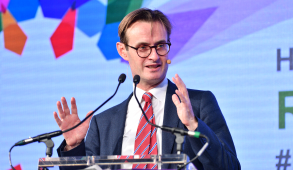Systems agree balanced budget, but risks could threaten services and investment
 At a board meeting on 7 July – the first since NHS England and NHS Improvement were formally merged on 1 July – NHS chief financial officer Julian Kelly (pictured) said 37 of the 42 ICBs had plans to deliver a balanced budget in 2022/23.
At a board meeting on 7 July – the first since NHS England and NHS Improvement were formally merged on 1 July – NHS chief financial officer Julian Kelly (pictured) said 37 of the 42 ICBs had plans to deliver a balanced budget in 2022/23.
‘Systems have done an extraordinary job given the pressures that are going on. They have committed to delivering financial plans that are balanced. Five systems still had a gap of £10m-£20m and have committed to continue to work with us to look at how that can be closed,’ he said.
The year-end plans reflected the ‘excellent and challenging’ work carried out by providers and commissioners in the face of rising inflation, a 1.8% real-terms reduction in funding, and the target of saving £5.5bn (around 5% of system funding). Overall, the NHS in England faced a real-terms cut – the first for many years, he said.
Demands for further savings to reflect more financial pressures, such as pay awards, would not be credible, and new pressures would lead to service or investment cuts. The final plans include the additional funding of £1.5bn to cover inflation costs that have become apparent since the beginning of the year.
Four risks
There were four main risks that could affect the plans. They include under-delivery of efficiencies – the spending review settlement was based on low levels of Covid, similar to levels seen last summer, allowing the reduction of costs by around £2.8m. But Covid inpatient cases were on the rise and now stood at around 11,500 compared with fewer than 1,000 a year ago. Covid levels are increasing staff absences, leading to higher temporary staff costs. Infection control arrangements made plans more challenging.
The second risk is increasing levels of emergency demand, which is putting pressure on ambulance services, A&E and planned care, and threatening the achievement of performance targets.
The upcoming pay award is a significant financial risk, Mr Kelly added. NHS England recognised the need to reward frontline staff, and it was an ‘operational necessity’ to retain staff to recover services. The NHS has been funded for a maximum 3% rise for Agenda for Change staff and doctors not on multi-year agreements, but it has been widely rumoured that teachers will be offered significantly more (up to 9%, according to some reports). But he said that each additional 1% would cost the NHS an extra £800m to £1bn.
‘We wait to see what the pay review body recommends, and it is for the government to take the decision. Clearly, we are supportive of the right settlement for our staff. Nonetheless, if the award is higher than 3%, and we are living within the money we currently have, that would entail very real decisions for us.
‘We are at a point where we are having to fund inflationary pressure of £1.5bn and a cut to the original settlement to fund other departmental pressures around Covid testing. We have emptied the coffers. We have already had to reduce early investment to some of our programmes by about £800m, so we would then be looking at cutting back on investment in major areas – primary care and cancer care, or indeed, at the margin, some big capital investments.’
Mr Kelly added: ‘It is not realistic to ask systems “to just do more efficiency" in a world where we are already asking them to do 4% or 5%, and where total NHS funding year-on-year is a real-terms cut.’
 NHS chief executive Amanda Pritchard (pictured) insisted that it was essential that the work of frontline staff tackling the pandemic and working on NHS recovery is properly recognised. ‘It is also an operational necessity if we are to retain the staff we need to make further inroads into long waits and deal with all the operational pressures. We have to be really clear that the right pay for our staff is a critical component of that,’ she said.
NHS chief executive Amanda Pritchard (pictured) insisted that it was essential that the work of frontline staff tackling the pandemic and working on NHS recovery is properly recognised. ‘It is also an operational necessity if we are to retain the staff we need to make further inroads into long waits and deal with all the operational pressures. We have to be really clear that the right pay for our staff is a critical component of that,’ she said.
A fourth risk is due to a range of service pressures and demands, such as providing medical care for Ukrainian refugees, proposals to expand the flu vaccination programme and shifts in budget responsibility from the Department of Health and Social Care to the NHS as part of finalising new financial directions for NHS England.
Mr Kelly added NHS England was committed to maintaining and expanding winter capacity. ‘In our original planning guidance, we set aside an extra £250m for extra capacity, for virtual wards. Our assessment is that we need to put more in, and, even in the context of everything I have just said, we are prioritising that investment because we think it is so critical to aiming to restore some safe operating margin in our acute hospitals as we look ahead into winter.’
The report added that the national body would continue to discuss these material risks, and the choices required to manage them, with the government.
Month 2 position
The financial position at month 2 in 2022/23 shows a year-to-date overspend of £89m against draft plans.
However, the position does not reflect the additional £1.5bn for inflation and the final plans that were submitted in June.
The report added that providers spent £494m on capital schemes at month 2, excluding IFRS16 spending. This represented 8% of the full-year forecast, which is in line with spending at the same stage of the last financial year. Providers are currently forecasting a year-end overspend of £220m against the 2022/23 capital budget of just over £8bn.
Related content
We are excited to bring you a fun packed Eastern Branch Conference in 2025 over three days.
This event is for those that will benefit from an overview of costing in the NHS or those new to costing and will cover why we cost and the processes.